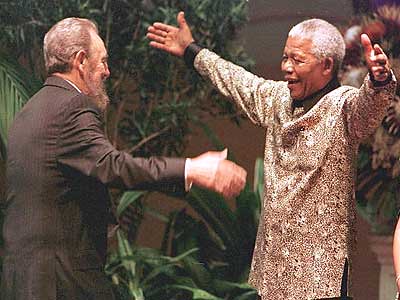
Commandante Fidel Castro greets President Nelson Mandela of South Africa when the socialist leader addressed the South African parliament in the late 1990s., a photo by Pan-African News Wire File Photos on Flickr.
Havana. December 11, 2013
NELSON MANDELA
Symbol of freedom and human dignity
• The Nobel Peace Prize laureate died December 5 in his Johannesburg residence, in the company of many family members, friends and South African government representatives
CLAUDIA FONSECA SOSA
Granma International
IT is possible that no other political leader of our times has been so admired for his resistance and tenacity in the struggle for racial equality as South African Nelson Mandela, who died on Thursday, December 5, at the age of 95.
His health gradually deteriorated throughout the year, the result of a lung infection contracted in prison.
Born July 18, 1918, his parents Henry Mandela and Nose Keni named him Rolihlahla Dalibhunga Mandela; however, he was known by the English name Nelson, which his British teacher gave him, or as Madiba, as he was affectionately called by his compatriots.
He graduated as a lawyer in 1942 and shortly afterward moved from his native Umtata to Johannesburg, where he joined the ranks of the African National Congress (ANC), an organization promoting peaceful protest against the segregationist regime and the brutal exploitation meted out to Black South Africans in a society in which they were the majority.
In the following years he founded the ANC Youth League, which took on importance within the ANC with its Civil Disobedience Campaign and in the Congress of the People, where the Freedom Charter known as the declaration of principles in the anti-apartheid struggle was adopted.
During this period, Mandela and his friend Oliver Tambo also organized a lawyer’s office which offered low-cost advice to many Blacks who otherwise would have had no legal representation. For his revolutionary activities, following the non-violent methods of resistance inherited from the Indian leader Mahatma Gandhi, Mandela and another 150 comrades were arrested on December 5, 1956, and sentenced to prison. Once released, Mandela opted for a change of strategy and headed the Umkhonto We Sizwe (Spear of the Nation), which became the armed wing of the ANC.
In 1962, he was once again arrested with a number of his colleagues on charges of conspiracy to bring down the regime through violence.
In his defense plea before the Pretoria Supreme Court in 1964, known as the Rivonia Trial, Mandela denounced the illegitimate government which sentenced him to life imprisonment. He stated, "The lack of human dignity experienced by Africans is the direct result of the policy of white supremacy (...) Legislation is designed to preserve such supremacy (...) Above all, we want equal political rights (…) I know this sounds revolutionary to whites in this country, because the majority of voters will be Africans. This makes the white man fear democracy…"
"During my lifetime I have dedicated myself to this struggle of the African people. I have fought against white domination and I have fought against black domination. I have cherished the ideal of a democratic and free society in which all persons live together in harmony and with equal opportunities. It is an ideal which I hope to live for and achieve. But if needs be, it is an ideal for which I am prepared to die," he affirmed.
After spending 27 years incarcerated in the harshest conditions – 18 in solitary confinement on Robben Island, the damp conditions of which badly affected his health – the then President of South Africa Frederik De Klerk released Mandela. During the period through February 1990 many governments and ant-racist movements had been demanding the liberation of the South African leader, who had become a universal symbol of emancipation and human dignity.
In 1991 he visited Cuba and was presented with the José Martí Order granted by the Council of State of the Republic of Cuba by the historic leader of the Revolution, Fidel Castro. On that occasion, Fidel emphasized his integrity and affirmed, "Mandela is one the most extraordinary symbols of this era."
Mandela took part in negotiations to establish a multiracial democracy in South Africa, a dream which became reality in 1994 with the first universal suffrage elections in the country, and was elected President of the Republic.
During his 1994-1999 government, he made every effort to achieve reconciliation among South Africans and contributed to the end of various conflicts on the African continent. He was named Father of the Nation and received countless international acknowledgements for his profoundly humanist thinking.
After retiring from politics, Mandela continued promoting social programs which contributed to consolidating racial peace in South Africa, a country which – according to current President Jacob Zuma – will be eternally grateful to him.
No comments:
Post a Comment